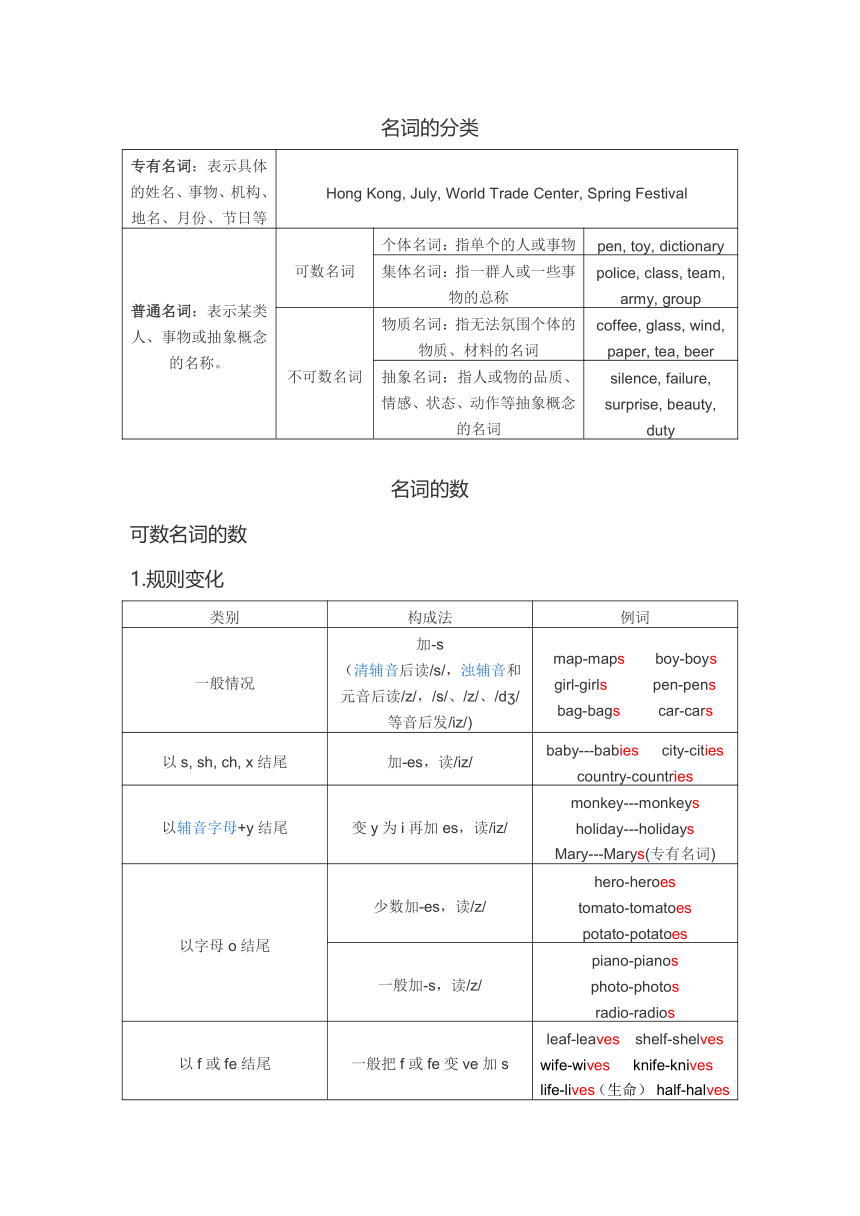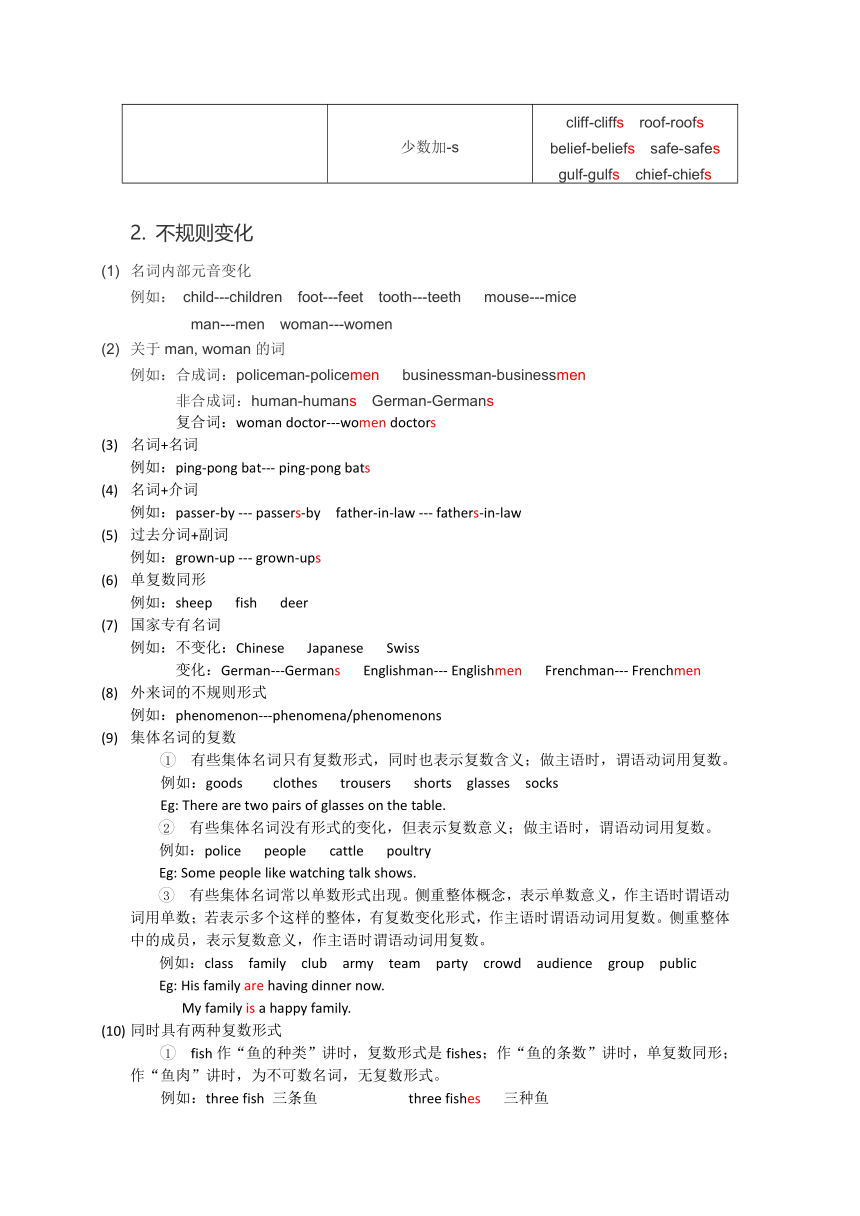2024届中考英语专项复习模块一词汇:1.名词(含答案)
文档属性
| 名称 | 2024届中考英语专项复习模块一词汇:1.名词(含答案) |

|
|
| 格式 | docx | ||
| 文件大小 | 25.9KB | ||
| 资源类型 | 教案 | ||
| 版本资源 | 人教新目标(Go for it)版 | ||
| 科目 | 英语 | ||
| 更新时间 | 2023-08-22 08:09:12 | ||
图片预览


文档简介
名词的分类
专有名词:表示具体的姓名、事物、机构、地名、月份、节日等 Hong Kong, July, World Trade Center, Spring Festival
普通名词:表示某类人、事物或抽象概念的名称。 可数名词 个体名词:指单个的人或事物 pen, toy, dictionary
集体名词:指一群人或一些事物的总称 police, class, team, army, group
不可数名词 物质名词:指无法氛围个体的物质、材料的名词 coffee, glass, wind, paper, tea, beer
抽象名词:指人或物的品质、情感、状态、动作等抽象概念的名词 silence, failure, surprise, beauty, duty
名词的数
可数名词的数
1.规则变化
类别 构成法 例词
一般情况 加-s (清辅音后读/s/,浊辅音和元音后读/z/,/s/、/z/、/d /等音后发/iz/) map-maps boy-boys girl-girls pen-pens bag-bags car-cars
以s, sh, ch, x结尾 加-es,读/iz/ baby---babies city-cities country-countries
以辅音字母+y结尾 变y为i再加es,读/iz/ monkey---monkeys holiday---holidays Mary---Marys(专有名词)
以字母o结尾 少数加-es,读/z/ hero-heroes tomato-tomatoes potato-potatoes
一般加-s,读/z/ piano-pianos photo-photos radio-radios
以f或fe结尾 一般把f或fe变ve加s leaf-leaves shelf-shelves wife-wives knife-knives life-lives(生命) half-halves
少数加-s cliff-cliffs roof-roofs belief-beliefs safe-safes gulf-gulfs chief-chiefs
不规则变化
名词内部元音变化
例如: child---children foot---feet tooth---teeth mouse---mice
man---men woman---women
关于man, woman的词
例如:合成词:policeman-policemen businessman-businessmen
非合成词:human-humans German-Germans
复合词:woman doctor---women doctors
名词+名词
例如:ping-pong bat--- ping-pong bats
名词+介词
例如:passer-by --- passers-by father-in-law --- fathers-in-law
过去分词+副词
例如:grown-up --- grown-ups
单复数同形
例如:sheep fish deer
国家专有名词
例如:不变化:Chinese Japanese Swiss
变化:German---Germans Englishman--- Englishmen Frenchman--- Frenchmen
外来词的不规则形式
例如:phenomenon---phenomena/phenomenons
集体名词的复数
有些集体名词只有复数形式,同时也表示复数含义;做主语时,谓语动词用复数。
例如:goods clothes trousers shorts glasses socks
Eg: There are two pairs of glasses on the table.
有些集体名词没有形式的变化,但表示复数意义;做主语时,谓语动词用复数。
例如:police people cattle poultry
Eg: Some people like watching talk shows.
有些集体名词常以单数形式出现。侧重整体概念,表示单数意义,作主语时谓语动词用单数;若表示多个这样的整体,有复数变化形式,作主语时谓语动词用复数。侧重整体中的成员,表示复数意义,作主语时谓语动词用复数。
例如:class family club army team party crowd audience group public
Eg: His family are having dinner now.
My family is a happy family.
同时具有两种复数形式
fish作“鱼的种类”讲时,复数形式是fishes;作“鱼的条数”讲时,单复数同形;作“鱼肉”讲时,为不可数名词,无复数形式。
例如:three fish 三条鱼 three fishes 三种鱼
I’d like some fish. 我想吃些鱼。
people作“人们,人”讲时,是集体名词;作“民族”讲时,复数形式是peoples
例如:some people 一些人 some peoples 一些民族
不可数名词的数
物质名词的数
物质名词表示泛指的某种物质时是不可数名词,但在表示具体意义或某种特殊含义时作可数名词用,前边可以用不定冠词等修饰,也可以有复数形式。
例如:tea--- a tea一杯茶--- two teas 两杯茶
glass--- a glass 一个玻璃杯
rains 大量的雨水 waters 大片水域 woods 树林
抽象名词的数
抽象名词表示具体事物时可作可数名词,可用a/an修饰,也有复数形式,“表示某种人或事”。
例如:a pity令人感到遗憾的事或人 a success 成功的事
a pleasure 愉快的事 a beauty 美好的事,美人
注意:在一些固定词组中,抽象名词也可用作可数名词。例如:have/take a rest, catch a cold, have a cough.
专有名词的数
专有名词一般视作不可数名词,但是在表示具体意义,指“一个/只......”时,也可作可数名词,可用不定冠词修饰,也有复数形式。
Eg: A Sam is looking for a job. 一个叫Sam 的人在找工作。
名词的格
名词的格分为主格、宾格和所有格。名词的主格和宾格相同,一般就是名词本身。名词所有格是表示名词的所属关系的形式,名词所有格的构成有-’s所有格、of所有格和双重所有格。
-’s所有格
构成
一般情况,在名词词尾加-’s
例如:Kate’s bag
若名词以-s或-es结尾,直接在其后加-’
例如:my students’ books
不以-s结尾的名词复数形式,直接在其后加-’s
例如:women’s skirt children’s toy
用法
两人或多人共有一个人或事物,只变化最后一个名词的词尾;如果是各自拥有,各个名词的词尾都要变化
例如:Lily and Lucy’s room (两人共有一个房间)
Lily’s and Lucy’s rooms (两人分别有一个房间)
表示时间、距离、国家、地点等的名词常用-’s所有格
例如:ten minutes’ walk 10分钟的步行路程
Beijing’s weather 北京的天气 today’s news 今天的新闻
表示某人的店铺、医院、学校、住宅及公共建筑时,-’s所有格后常常不出现它所修饰的名词。
例如:at the doctor’s 在医院 at Tony’s 在唐尼家
表示节日
例如:Teachers’ Day Children’s Day Mother’s Day
of所有格
表示无生命名词的所有关系
例如: the window of the room
名词化的形容词的所有关系用of所有格
例如:the problems of the disabled
双重所有格
“名词+of+ -’s所有格/名词性物主代词”构成双重所有格。如果在表示所属物的名词 前有冠词、数词、不定代词或指示代词时,常用双重所有格的形式来表示所有关系。
例如:a photo of mine
Some books of Ben’s
注意:of前的名词是picture、photo等时,双重所有格与of所有格表示的含义不同
例如:a picture of my father 我父亲(本人)的一张照片
a picture of my father’s 我父亲(拥有)的一张照片
名词的修饰语
表示数量的修饰语
只修饰可数名词
few, a few, many, several, a great/good many of, a number of, a large/great number of
只修饰不可数名词
little, a little, much, a good/great deal of, a bit of
既修饰可数名词又修饰不可数名词
some, a lot of, lots of, plenty of, all, most
单位词的修饰语
普通单位词
a piece of bread, a bit of water
度量单位词
two feet of snow a ton of rain a pound of meat
容积单位词
a cup of tea a glass of water a bottle of milk a bag of rice
形状单位词
a bar of chocolate a drop of water
集体单位词
a team of players a crowd of people a group of children
例题:
_____ mothers can’t go shopping, because they have to clean the houses.
Alice and Lily’s B. Alice’s and Lily’s C. Alice’s and Lily D. Alice and Lily
——Excuse me. How far is the post office from here
——It’s about ______ walk.
ten minute B. ten minutes C.ten minutes’ D. ten minute’s
I’d like _________.
A.two cup of coffee B.two cups of coffees C. two cup of coffees D.two coffees
There is _______ news about this movie star in the newspaper. Where can I get some
many B. a few C. a lot D. little
---Could you give me a few _______ on how to spend the coming summer holiday
---OK. Let me see.
hobbies B. knowledge C.suggestions D. information
Uncle Wang brought two _____ for me yesterday.
Bread B. milk C. dictionary D. watches
---What would you like to drink, girls
---_______, please.
Two glass of water B. Two glass of waters C. Two cups of tea D. Two cups of teas
The students didn’t fine much ____ about the topic on that website.
report B. article C. information D. story
How many ______ are there in the basket
potato B. bread C.tomatoes D. egg
---What _____ do you have for Daniel
---I think he should study harder than before.
news B. advice C. help D. information
Some ______ came to our school for a visit that day.
Germans B. Germen C. Germany D. Germanies
Mary’s skirt is the same as her ______.
sister B. brother C. sister’s D. brothers
--- ______ fathers didn’t come to the meeting. Why
----Because they have gone to Beijing.
Jeff’s and Amy’s B. Jeff and Amy C. Jeff’s and Amy D.Jeff and Amy’s
---How many ______ do you see in the picture
---Three.
A.dog B. child C. sheeps D. sheep
15. Tom is in good health, because he often exercises and eats a lot of healthy ______.
A.food B. water C. pear D. carrot
专有名词:表示具体的姓名、事物、机构、地名、月份、节日等 Hong Kong, July, World Trade Center, Spring Festival
普通名词:表示某类人、事物或抽象概念的名称。 可数名词 个体名词:指单个的人或事物 pen, toy, dictionary
集体名词:指一群人或一些事物的总称 police, class, team, army, group
不可数名词 物质名词:指无法氛围个体的物质、材料的名词 coffee, glass, wind, paper, tea, beer
抽象名词:指人或物的品质、情感、状态、动作等抽象概念的名词 silence, failure, surprise, beauty, duty
名词的数
可数名词的数
1.规则变化
类别 构成法 例词
一般情况 加-s (清辅音后读/s/,浊辅音和元音后读/z/,/s/、/z/、/d /等音后发/iz/) map-maps boy-boys girl-girls pen-pens bag-bags car-cars
以s, sh, ch, x结尾 加-es,读/iz/ baby---babies city-cities country-countries
以辅音字母+y结尾 变y为i再加es,读/iz/ monkey---monkeys holiday---holidays Mary---Marys(专有名词)
以字母o结尾 少数加-es,读/z/ hero-heroes tomato-tomatoes potato-potatoes
一般加-s,读/z/ piano-pianos photo-photos radio-radios
以f或fe结尾 一般把f或fe变ve加s leaf-leaves shelf-shelves wife-wives knife-knives life-lives(生命) half-halves
少数加-s cliff-cliffs roof-roofs belief-beliefs safe-safes gulf-gulfs chief-chiefs
不规则变化
名词内部元音变化
例如: child---children foot---feet tooth---teeth mouse---mice
man---men woman---women
关于man, woman的词
例如:合成词:policeman-policemen businessman-businessmen
非合成词:human-humans German-Germans
复合词:woman doctor---women doctors
名词+名词
例如:ping-pong bat--- ping-pong bats
名词+介词
例如:passer-by --- passers-by father-in-law --- fathers-in-law
过去分词+副词
例如:grown-up --- grown-ups
单复数同形
例如:sheep fish deer
国家专有名词
例如:不变化:Chinese Japanese Swiss
变化:German---Germans Englishman--- Englishmen Frenchman--- Frenchmen
外来词的不规则形式
例如:phenomenon---phenomena/phenomenons
集体名词的复数
有些集体名词只有复数形式,同时也表示复数含义;做主语时,谓语动词用复数。
例如:goods clothes trousers shorts glasses socks
Eg: There are two pairs of glasses on the table.
有些集体名词没有形式的变化,但表示复数意义;做主语时,谓语动词用复数。
例如:police people cattle poultry
Eg: Some people like watching talk shows.
有些集体名词常以单数形式出现。侧重整体概念,表示单数意义,作主语时谓语动词用单数;若表示多个这样的整体,有复数变化形式,作主语时谓语动词用复数。侧重整体中的成员,表示复数意义,作主语时谓语动词用复数。
例如:class family club army team party crowd audience group public
Eg: His family are having dinner now.
My family is a happy family.
同时具有两种复数形式
fish作“鱼的种类”讲时,复数形式是fishes;作“鱼的条数”讲时,单复数同形;作“鱼肉”讲时,为不可数名词,无复数形式。
例如:three fish 三条鱼 three fishes 三种鱼
I’d like some fish. 我想吃些鱼。
people作“人们,人”讲时,是集体名词;作“民族”讲时,复数形式是peoples
例如:some people 一些人 some peoples 一些民族
不可数名词的数
物质名词的数
物质名词表示泛指的某种物质时是不可数名词,但在表示具体意义或某种特殊含义时作可数名词用,前边可以用不定冠词等修饰,也可以有复数形式。
例如:tea--- a tea一杯茶--- two teas 两杯茶
glass--- a glass 一个玻璃杯
rains 大量的雨水 waters 大片水域 woods 树林
抽象名词的数
抽象名词表示具体事物时可作可数名词,可用a/an修饰,也有复数形式,“表示某种人或事”。
例如:a pity令人感到遗憾的事或人 a success 成功的事
a pleasure 愉快的事 a beauty 美好的事,美人
注意:在一些固定词组中,抽象名词也可用作可数名词。例如:have/take a rest, catch a cold, have a cough.
专有名词的数
专有名词一般视作不可数名词,但是在表示具体意义,指“一个/只......”时,也可作可数名词,可用不定冠词修饰,也有复数形式。
Eg: A Sam is looking for a job. 一个叫Sam 的人在找工作。
名词的格
名词的格分为主格、宾格和所有格。名词的主格和宾格相同,一般就是名词本身。名词所有格是表示名词的所属关系的形式,名词所有格的构成有-’s所有格、of所有格和双重所有格。
-’s所有格
构成
一般情况,在名词词尾加-’s
例如:Kate’s bag
若名词以-s或-es结尾,直接在其后加-’
例如:my students’ books
不以-s结尾的名词复数形式,直接在其后加-’s
例如:women’s skirt children’s toy
用法
两人或多人共有一个人或事物,只变化最后一个名词的词尾;如果是各自拥有,各个名词的词尾都要变化
例如:Lily and Lucy’s room (两人共有一个房间)
Lily’s and Lucy’s rooms (两人分别有一个房间)
表示时间、距离、国家、地点等的名词常用-’s所有格
例如:ten minutes’ walk 10分钟的步行路程
Beijing’s weather 北京的天气 today’s news 今天的新闻
表示某人的店铺、医院、学校、住宅及公共建筑时,-’s所有格后常常不出现它所修饰的名词。
例如:at the doctor’s 在医院 at Tony’s 在唐尼家
表示节日
例如:Teachers’ Day Children’s Day Mother’s Day
of所有格
表示无生命名词的所有关系
例如: the window of the room
名词化的形容词的所有关系用of所有格
例如:the problems of the disabled
双重所有格
“名词+of+ -’s所有格/名词性物主代词”构成双重所有格。如果在表示所属物的名词 前有冠词、数词、不定代词或指示代词时,常用双重所有格的形式来表示所有关系。
例如:a photo of mine
Some books of Ben’s
注意:of前的名词是picture、photo等时,双重所有格与of所有格表示的含义不同
例如:a picture of my father 我父亲(本人)的一张照片
a picture of my father’s 我父亲(拥有)的一张照片
名词的修饰语
表示数量的修饰语
只修饰可数名词
few, a few, many, several, a great/good many of, a number of, a large/great number of
只修饰不可数名词
little, a little, much, a good/great deal of, a bit of
既修饰可数名词又修饰不可数名词
some, a lot of, lots of, plenty of, all, most
单位词的修饰语
普通单位词
a piece of bread, a bit of water
度量单位词
two feet of snow a ton of rain a pound of meat
容积单位词
a cup of tea a glass of water a bottle of milk a bag of rice
形状单位词
a bar of chocolate a drop of water
集体单位词
a team of players a crowd of people a group of children
例题:
_____ mothers can’t go shopping, because they have to clean the houses.
Alice and Lily’s B. Alice’s and Lily’s C. Alice’s and Lily D. Alice and Lily
——Excuse me. How far is the post office from here
——It’s about ______ walk.
ten minute B. ten minutes C.ten minutes’ D. ten minute’s
I’d like _________.
A.two cup of coffee B.two cups of coffees C. two cup of coffees D.two coffees
There is _______ news about this movie star in the newspaper. Where can I get some
many B. a few C. a lot D. little
---Could you give me a few _______ on how to spend the coming summer holiday
---OK. Let me see.
hobbies B. knowledge C.suggestions D. information
Uncle Wang brought two _____ for me yesterday.
Bread B. milk C. dictionary D. watches
---What would you like to drink, girls
---_______, please.
Two glass of water B. Two glass of waters C. Two cups of tea D. Two cups of teas
The students didn’t fine much ____ about the topic on that website.
report B. article C. information D. story
How many ______ are there in the basket
potato B. bread C.tomatoes D. egg
---What _____ do you have for Daniel
---I think he should study harder than before.
news B. advice C. help D. information
Some ______ came to our school for a visit that day.
Germans B. Germen C. Germany D. Germanies
Mary’s skirt is the same as her ______.
sister B. brother C. sister’s D. brothers
--- ______ fathers didn’t come to the meeting. Why
----Because they have gone to Beijing.
Jeff’s and Amy’s B. Jeff and Amy C. Jeff’s and Amy D.Jeff and Amy’s
---How many ______ do you see in the picture
---Three.
A.dog B. child C. sheeps D. sheep
15. Tom is in good health, because he often exercises and eats a lot of healthy ______.
A.food B. water C. pear D. carrot
同课章节目录
- 词法
- 名词
- 动词和动词短语
- 动词语态
- 动词时态
- 助动词和情态动词
- 非谓语动词
- 冠词
- 代词
- 数词和量词
- 形容词副词及其比较等级
- 介词和介词短语
- 连词和感叹词
- 构词法
- 相似、相近词比较
- 句法
- 陈述句
- 一般疑问句和否定疑问句
- 特殊疑问句及选择疑问句
- 反意疑问句
- 存在句(There be句型)
- 宾语从句
- 定语从句
- 状语从句
- 主谓一致问题
- 简单句
- 并列句
- 复合句
- 主谓一致
- 主、表语从句
- 名词性从句
- 直接引语和间接引语
- 虚拟语气
- 感叹句
- 强调句
- 倒装句
- 祈使句
- 句子的成分
- 句子的分类
- 题型专区
- 单项选择部分
- 易错题
- 完形填空
- 阅读理解
- 词汇练习
- 听说训练
- 句型转换
- 补全对话
- 短文改错
- 翻译
- 书面表达
- 任务型阅读
- 语法填空
- 其他资料
